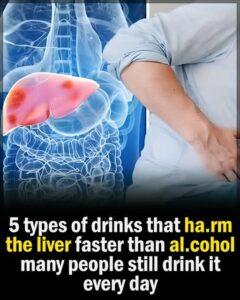The liver is one of the most essential organs in the human body, performing crucial functions related to digestion, detoxification, and nutrient storage.
It breaks down fats, metabolizes carbohydrates, stores vitamins and minerals, and filters harmful substances from the blood.
However, this vital organ is increasingly under threat, not only from alcohol consumption but also from the growing intake of sugary beverages such as sodas, packaged fruit juices, and energy drinks.
Recent scientific research has revealed that these drinks can cause damage comparable to that caused by excessive alcohol, leading to serious long-term liver diseases.

One of the most common liver conditions linked to diet and lifestyle is nonalcoholic fatty liver disease, or NAFLD. This disorder develops when fat accumulates excessively within liver cells, often without the person consuming alcohol in significant amounts. NAFLD has become a global health concern, affecting an estimated thirty percent of the world’s population. The rise in obesity and type 2 diabetes plays a major role in this trend. Poor dietary habits, particularly those involving high sugar consumption, contribute to this disease by increasing fat storage in the liver and promoting inflammation. If left untreated, NAFLD can progress to a more severe condition known as nonalcoholic steatohepatitis, or NASH, where inflammation and cell damage lead to scarring and possibly liver failure.
A key factor in this growing health problem is the widespread availability and marketing of sugary drinks. Many people consume these beverages daily, often unaware of how much sugar they contain. A single can of soda can have as much as ten teaspoons of sugar, primarily in the form of high fructose corn syrup. When consumed in large quantities, fructose is metabolized almost entirely by the liver. Unlike glucose, which the body’s cells use for energy, excess fructose is converted into fat within the liver. Over time, this process leads to fatty deposits, inflammation, and insulin resistance. These metabolic changes not only increase the risk of NAFLD but also contribute to obesity, cardiovascular disease, and type 2 diabetes.
Fruit juice, despite its reputation as a healthy alternative to soda, can also harm the liver when consumed in excess. Although it is derived from fruit, most commercial juices contain as much sugar as soft drinks. The natural sugars in fruit juice, mainly fructose, behave the same way in the liver as those in sweetened beverages. The difference lies in the absence of fiber. Whole fruits contain fiber that slows the absorption of sugar, preventing rapid spikes in blood glucose and reducing the burden on the liver. In contrast, fruit juice delivers a concentrated dose of sugar with little nutritional balance. This overload encourages fat production and storage within liver cells, setting the stage for fatty liver disease.
To protect liver health, it is important to moderate sugar intake and choose beverages wisely. Water, herbal teas, and unsweetened drinks are far better options for hydration. Replacing sugary beverages with water or whole fruits can significantly reduce the risk of liver fat buildup. Regular physical activity, balanced nutrition, and maintaining a healthy weight also play key roles in preventing liver disease. Public awareness campaigns should emphasize that not only alcohol but also everyday sugary drinks pose a real threat to liver function.
In conclusion, while the liver is capable of remarkable regeneration, it cannot withstand constant overload from excess sugar. The modern diet, filled with sweetened beverages and processed foods, is silently damaging this vital organ. Understanding how sugar affects the liver and making informed choices can prevent irreversible harm. Protecting liver health requires mindful consumption, balanced nutrition, and awareness that what we drink can be just as important as what we eat.





